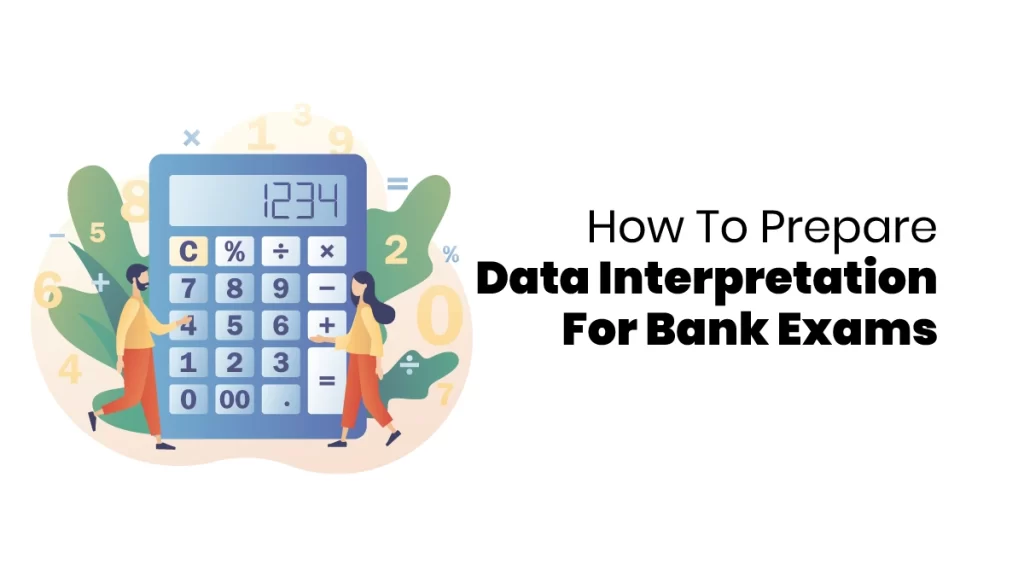When you get some information and need to answer questions using that information, it’s called data interpretation. There are usually 10-15 questions about this in bank exams in prelims and 10-20 in mains. Remember, you must also be good at other math topics to understand the graphs or data in these questions. Data Interpretation for bank exams is crucial in the preparation for clearing the banking exam.
What is Data Interpretation?
Data interpretation helps us understand numerical information that has been collected and presented. Sometimes, this data is complex to grasp in its raw form, so analysts break it down for us.
For example, when Founders pitch their ideas to investors, they explain data like market size and growth rate to make it easier to understand. There are two main ways to interpret data:
- Qualitative methods: Explaining data using words or descriptions.
- Quantitative methods: Explaining data using numbers or statistics.
Qualitative Data Interpretation
Qualitative data interpretation is about understanding data in numbers and words or categories. It involves coding the data into numbers for analysis. There are two main types of qualitative data: nominal (like categories without a specific order) and ordinal (like categories with a particular order). Interpreting ordinal data is usually more accessible because it often already has numbers assigned to it. Nominal data needs to be coded before it can be adequately understood.
Quantitative Data Interpretation
Quantitative data interpretation involves comprehending numerical information expressed in numbers and analyzing it through numerical methods rather than verbal descriptions. There are two types of quantitative data: discrete and continuous. Continuous data can be subdivided into intervals and ratios, all of which are numeric.
In contrast to qualitative data, which often requires coding for interpretation, quantitative data analysis doesn’t necessitate this extra step. Instead, it uses statistical techniques like standard deviation, mean, and median to extract understandings and make informed conclusions.
Types of Data Interpretation Questions
Different types of Data Interpretation questions can be asked in bank exams. Here are some formats you might encounter for bank exam data interpretation preparation:
- Bar Graph: Information is shown in bars, and questions are based on this data.
- Tabular Form: Data is presented in a table; you must interpret it to answer questions.
- Line Chart: Data is represented in a linear or line format, and questions are asked based on it.
- Caselet Form: Data is provided in paragraphs instead of visual representations like graphs or charts.
- Pie Chart: Data is shown in a circular chart, and questions may revolve around one or more pie charts.
- Missing Data: You might encounter questions where some elements in a table are missing, and you must find them to answer them.

Tips for Preparing Data Interpretation
Here are some easy tips to help you tackle for bank exam data interpretation:
Practice Maths
Since data interpretation involves numbers, practice doing maths regularly, which will help you get faster and more accurate.
Understand the Question
Take your time to understand the given information. The more you know, the easier it will be to solve. Practice different types of questions to get better at them.
Be Quick and Accurate
Data Interpretation often involves numbers and calculations. Get comfortable with them to solve questions faster. Learn shortcuts for standard calculations like squares and multiplication. With practice, you’ll get faster and more accurate.
Skip the Calculator
You can’t use a calculator in bank exams, so practicing without one is best. This way, you’ll improve your ability to solve questions accurately. Remember, this applies to all competitive exams, not just bank ones.
Don’t Forget the Units
After solving a question, remember to include the units. Many people overlook this, but it’s essential. Practice writing the units along with your answers to help you remember them.
Practice Regularly
Practice every day to improve your Data Interpretation. Since most questions involve bar graphs and pie charts, read newspapers and magazines regularly. Some questions might be based on information you find there.
These data interpretation strategies for bank exams allow one to clear this section quickly.
Tips to Solve Data Interpretation Questions
Here are some easy tips to help you solve Data Interpretation questions:
- Read the whole question carefully: Read all the information, whether numbers or graphs.
- Understand the data: Give some time to understand the data. There is no need to worry about extra time; you can also use some more time.
- Watch the units: Sometimes, different units are used in one question. Pay attention so you use the correct units for your calculations.
- Estimate: If the answer options are far apart, you can round numbers to simplify calculations.
- Check the last digit: If each answer option has a different last digit, you can often find the correct answer by looking at the last digit of your calculations.
- Practice mental maths: Try doing calculations in your head as much as possible. It’ll help you solve problems faster.
- Remember these formulas: For pie charts, remember that you can find a sector’s value using the angle or percentage of the industry. Keep these formulas in mind while solving questions.
All these tips help with preparation for the bank exam data interpretation. Are you striving to excel in bank exams? Look no further than Finprov’s bank coaching center, the ultimate destination for aspiring banking professionals. Our dynamic and comprehensive approach ensures your success in building a rewarding banking career.
Our bank coaching center in Ernakulam covers many subjects essential for excelling in bank exams, including quantitative aptitude, reasoning, English language skills, general awareness, and in-depth banking topics crucial for securing top highest paying banking jobs.
We offer flexibility in learning. Whether you prefer online or offline learning, you can select it based on your preferences. We also provide 24/7 mentorship support to all learners, making them instantly clarify their doubts.





















